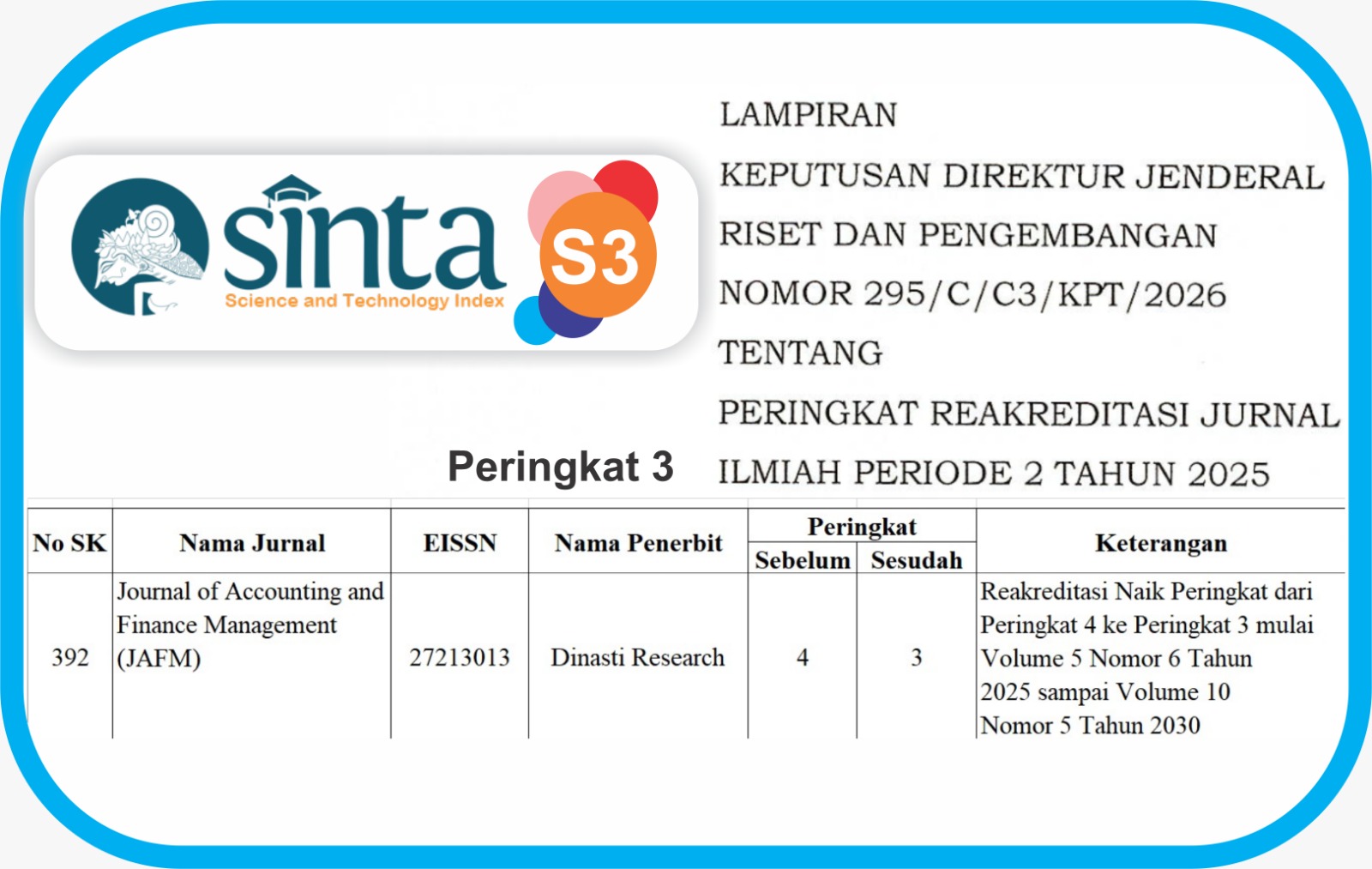Hermeneutics of Schleiermacher, Dilthey, Heidegger and Gadamer on Financial Statements in the Indonesia Stock Exchange (2010–2024)
DOI:
https://doi.org/10.38035/jafm.v6i3.2284Keywords:
Philosophical Hermeneutics, Financial Narratives, Narrative Legitimacy Construction Theory (NLCT), Heidegger, Gadamer, Indonesia Stock Exchange, Post-positivist AccountingAbstract
This study investigates the interpretive and philosophical dimensions of financial reporting practices on the Indonesia Stock Exchange (IDX) from 2010 to 2024, through the lens of classical and contemporary hermeneutics. Rooted in the traditions of Friedrich Schleiermacher, Wilhelm Dilthey, Martin Heidegger, and Hans-Georg Gadamer, this research reinterprets financial reports particularly annual and sustainability disclosures not as neutral, technical documents, but as culturally embedded, historically conditioned texts. These documents are viewed as expressions of corporate subjectivity and intersubjective engagement with stakeholders, regulators, and the public. The research adopts a qualitative interpretive methodology, emphasizing textual exegesis over empirical generalization. Drawing on the hermeneutic principles of pre-understanding, historicality, and the fusion of horizons, this paper performs a layered reading of selected financial statements from Indonesian public companies across multiple sectors. The study highlights how financial narratives evolve in language, structure, tone, and ethical framing over time. The novelty of this research lies in the formulation of a new conceptual framework: Narrative Legitimacy Construction Theory (NLCT). NLCT posits that financial reporting is not merely about compliance or representation, but a dynamic narrative strategy used by firms to construct legitimacy in fluctuating political-economic environments. This theory integrates hermeneutic phenomenology with semiotic accounting, showing how meaning-making in financial texts reflects deeper ontological claims about value, risk, time, and responsibility. The findings reveal a shift from mechanistic, number-driven disclosure to ethically resonant narratives, particularly after the implementation of digital transparency frameworks and sustainability mandates. Companies strategically deploy metaphors, temporal references, and identity claims to construct a coherent and persuasive corporate image. This research contributes to the development of post-positivist accounting thought, expands the hermeneutic approach to financial analysis, and informs practitioners and regulators about the embedded ethical and narrative dimensions of financial communication.
References
Aerts, W. (2005). Picking up the pieces: Impression management in the retrospective attributional framing of accounting outcomes. Accounting, Organizations and Society, 30(6), 493–517. https://doi.org/10.1016/j.aos.2004.07.001
Beattie, V., & Davie, E. S. (2006). Theoretical studies of narrative: A review of the empirical literature in accounting. Journal of Accounting Literature, 25, 145–184.
Brown, N., & Deegan, C. (1998). The public disclosure of environmental performance information—A dual test of media agenda setting theory and legitimacy theory. Accounting and Business Research, 29(1), 21–41. https://doi.org/10.1080/00014788.1998.9729564
Cho, C. H., & Patten, D. M. (2007). The role of environmental disclosures as tools of legitimacy: A research note. Accounting, Organizations and Society, 32(7–8), 639–647. https://doi.org/10.1016/j.aos.2006.09.009
Dilthey, W. (1989). Introduction to the Human Sciences (R. A. Makkreel & F. Rodi, Eds.). Princeton, NJ: Princeton University Press. (Original work published 1883)
Gadamer, H.-G. (2004). Truth and Method (2nd ed., J. Weinsheimer & D. G. Marshall, Trans.). New York: Continuum. (Original work published 1960)
Gray, R., Kouhy, R., & Lavers, S. (1995). Corporate social and environmental reporting: A review of the literature and a longitudinal study of UK disclosure. Accounting, Auditing & Accountability Journal, 8(2), 47–77. https://doi.org/10.1108/09513579510146996
Gray, R., Owen, D., & Adams, C. (2009). Accounting and accountability: Changes and challenges in corporate social and environmental reporting. London: Routledge.
Heidegger, M. (1962). Being and Time (J. Macquarrie & E. Robinson, Trans.). New York: Harper & Row. (Original work published 1927)
Hines, R. D. (1988). Financial accounting: In communicating reality, we construct reality. Accounting, Organizations and Society, 13(3), 251–261. https://doi.org/10.1016/0361-3682(88)90003-7
Hooks, J., & Van Staden, C. J. (2011). Evaluating environmental disclosures: The relationship between quality and extent measures. The British Accounting Review, 43(3), 200–213. https://doi.org/10.1016/j.bar.2011.06.005
Macintosh, N. B. (2004). Accounting, accountants and accountability: Poststructuralist positions. London: Routledge.
Neu, D., Warsame, H., & Pedwell, K. (1998). Managing public impressions: Environmental disclosures in annual reports. Accounting, Organizations and Society, 23(3), 265–282. https://doi.org/10.1016/S0361-3682(97)00008-1
O'Donovan, G. (2002). Environmental disclosures in the annual report: Extending the applicability and predictive power of legitimacy theory. Accounting, Auditing & Accountability Journal, 15(3), 344–371. https://doi.org/10.1108/09513570210435870
Patten, D. M. (2002). The relation between environmental performance and environmental disclosure: A research note. Accounting, Organizations and Society, 27(8), 763–773. https://doi.org/10.1016/S0361-3682(02)00028-4
Ricoeur, P. (1981). Hermeneutics and the Human Sciences (J. B. Thompson, Ed. & Trans.). Cambridge: Cambridge University Press.
Schleiermacher, F. (1998). Hermeneutics and Criticism and Other Writings (A. Bowie, Trans.). Cambridge: Cambridge University Press. (Original work published 1838)
Suchman, M. C. (1995). Managing legitimacy: Strategic and institutional approaches. Academy of Management Review, 20(3), 571–610. https://doi.org/10.5465/amr.1995.9508080331
Tinker, T., Merino, B. D., & Neimark, M. D. (1982). The normative origins of positive theories: Ideology and accounting thought. Accounting, Organizations and Society, 7(2), 167–200. https://doi.org/10.1016/0361-3682(82)90019-8
Van Manen, M. (1990). Researching lived experience: Human science for an action sensitive pedagogy. Albany: State University of New York Press.
Downloads
Published
How to Cite
Issue
Section
License
Copyright (c) 2025 Apollo Apollo, Swarmilah Hariani, Yudhi Herliansyah

This work is licensed under a Creative Commons Attribution 4.0 International License.
Authors who publish their manuscripts in this journal agree to the following conditions:
- The copyright on each article belongs to the author(s).
- The author acknowledges that the Journal of Accounting and Finance Management (JAFM) has the right to be the first to publish with a Creative Commons Attribution 4.0 International license (Attribution 4.0 International (CC BY 4.0).
- Authors can submit articles separately, arrange for the non-exclusive distribution of manuscripts that have been published in this journal into other versions (e.g., sent to the author's institutional repository, publication into books, etc.), by acknowledging that the manuscript has been published for the first time in the Journal of Accounting and Finance Management (JAFM).



























